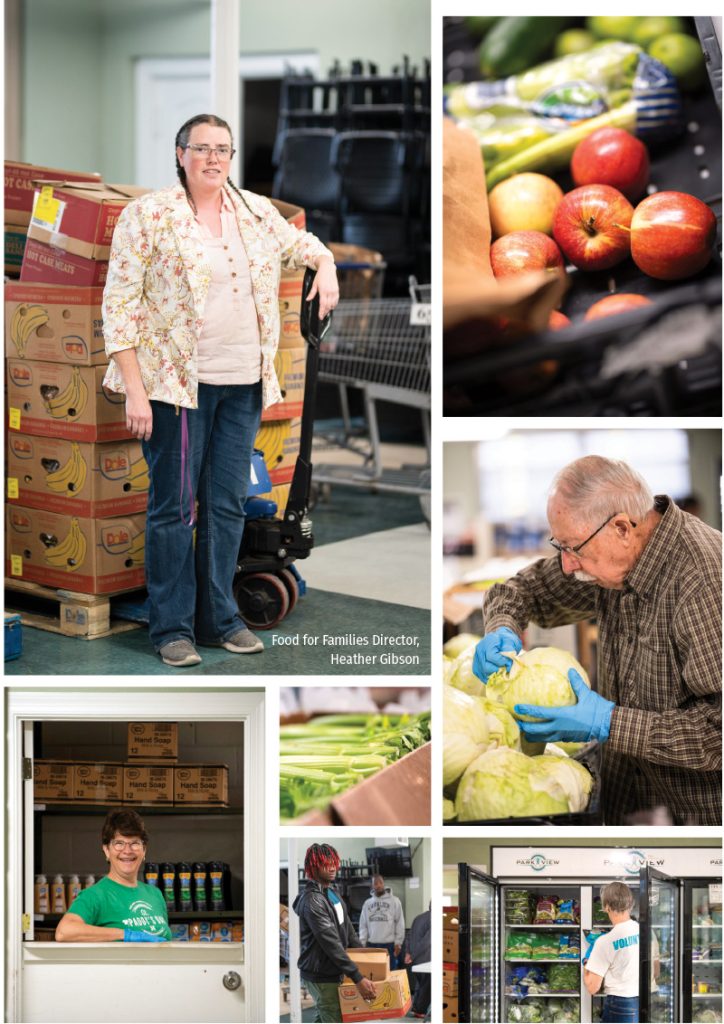Park View Community Mission’s Comprehensive Fight Against Food Insecurity
By: Emily Mook | Photos By: Ashlee Glen
For many of us, food can be both fun and frustrating. When it comes to our culinary experiences, our emotions may range from excitement about trying a new recipe or restaurant to ennui over planning and preparation. We consider notions of form, function, and perhaps even presentation, and we may forget what a privilege it is to think about food in such certain terms and to contend with things like indecision and overwhelm rather than hunger and food insecurity.
Merriam-Webster defines food insecurity as “the fact or an instance of being unable to consistently access or afford adequate food,” and according to the 2024 USDA Food Security Report (the latest data available), a staggering 13.5 percent of U.S. households experienced food insecurity in 2023. Lynchburg’s statistics mirror that figure very closely; according to Park View Community Mission’s Food for Families Director Heather Gibson, the latest Feeding America’s “Map the Meal Gap” data indicates that 13.6 percent of Lynchburg’s citizens are food insecure. That data also indicates that surrounding counties aren’t too far behind: Appomattox is at 12.1 percent, Amherst is at 11.8 percent, Campbell County is at 11.2 percent, and Bedford is at 10.7 percent. As these numbers continue to climb globally, nationally, and locally, food-distributing nonprofits are experiencing more demand than ever before and thus need more attention and community support than ever before. Lynchburg is home to several such organizations, including the outstanding and uniquely comprehensive 501(c)(3) Park View Community Mission.
Located at the corner of Memorial Avenue and Wadsworth Street, Park View Community Mission began as a weekly Wednesday night dinner service in 1996. It was spearheaded by the late Fred Fauber and the late Larry Brooks and initially run by members of the now-disbanded congregation of Park View United Methodist Church. Those weekly dinners continue today as the Park View Café, providing at least 100 meals each Wednesday from 4:30 to 5:30 p.m. A carryout setup—introduced after the onset of the COVID-19 pandemic—allows neighbors to dine in or take their meals to go. Volunteers (and Park View staff, as needed) conduct all steps of the process.
“Typically, we have various groups cook and serve the food,” Gibson noted. “Volunteers can come and help set up, serve, and take down at the end of the dinner. If they want to cook, they can reach out to the director of the Café and she can schedule a time for them to cook. If we don’t have enough volunteers, then the staff pitches in. Due to the bad weather in February, we had a group cancel, so I cooked chili for 100.”
After 20 years of providing weekly meals, Park View added a service that would ultimately become the cornerstone of their organization: a food pantry called Food for Families. Since its creation in 2006, Food for Families has grown into Lynchburg’s largest food pantry and into the largest client-choice pantry in the state west of Richmond.

The pantry is open from 9:30 a.m. to 2:00 p.m. on Thursdays and Saturdays, and emergency food bags are available to anyone who needs them on the days the pantry isn’t open.
“We began serving groceries to about 40 families per week, and we now serve over 400 families each week,” said Gibson. “In 2024, Food for Families served 16,479 families from Lynchburg, Amherst, Appomattox, and Bedford and Campbell Counties. We receive USDA food from the Blue Ridge Area Food Bank; this food is given free to anyone living in Virginia whose yearly income is below 250% over the poverty line. We also receive weekly donations from Walmart, Kroger, Panera, Little Caesars Pizza, Flowers Foods, Tree of Life Midtown, and Starbucks. Along with these donations, we receive donations from food drives done by churches and businesses along with donations from individuals. We can always use non-perishable donations.”
Park View also welcomes non-perishable donations for its Food for Thought initiative, which provides food during the weekends to Lynchburg students in need. Launched in 2018, this initiative provides elementary school students with bags including two breakfasts, two lunches, and three dinners and middle and high school students with access to food pantries.
“Students are identified by the guidance counselors of the schools, and parents sign a permission slip to allow their children to receive food,” Gibson stated. “Each school decides how to distribute the bags at the end of the day on Fridays. Some do it in the hallways and some in the last class of the day. Foods given out include ravioli, tuna, chicken noodle soup, cups of mac & cheese, individual cereal cups, shelf-stable milk, and snacks. Food for Thought provided 38,865 weekend meal bags last year.”
Food insecurity is a complex issue that extends beyond food scarcity, and thus the fight against it necessitates holistic education and support.
Park View’s remaining initiatives—the Clothing Connection, the Community Resource Center, and the Life Skills Institute—allow the organization to address and mitigate other roadblocks to food security.
The Clothing Connection provides free clothing, the Community Resource Center provides eviction and utility assistance and matches neighbors with other organizations as needed, and the Life Skills Institute imparts practical life and career skills.

“Our Life Skills Institute provides job readiness training through the ‘Vital Skills with Jeff from CVCC’ series,” remarked Gibson. “It teaches the necessary soft skills for retention, interviews, making career goals, and networking. LSI has classes on financial wellness and computer skills, as well as a series of cooking classes through the VA Extension Office. We also provide clothing for job interviews and to start your new job.”
In addition to offering these six invaluable initiatives, Park View is dedicated to raising community awareness about food insecurity and about how to join in the fight against it.
“We have an educational component to make people in the community aware of food insecurity,” Gibson said. “The directors of the programs are always willing to discuss Park View with civic groups, college classes, and churches. We also have the Teal Bag Initiative that has a food drive and educational components. We will give any organization a presentation and will provide teal reusable shopping bags with lists of needed items. We then arrange a pickup time for the bags.”
As demand for these comprehensive services continues to rise, Park View is hoping to find a larger physical space to meet that demand.
“With the increase in neighbors, we have outgrown our physical space,” noted Gibson. “Our neighbors have to wait outside until their numbers are called before they can come inside. We are looking at options to be able to serve more families in our community.”
Community awareness and support are critical in ensuring that Park View Community Mission can continue to serve our most vulnerable neighbors. As we consider our feelings about and relationships with food, may we also consider the feelings and needs of those whose relationships with food are less secure.
“Individuals can help in the fight against food insecurity by donating to local food pantries in both time and money,” Gibson stated. “It takes quite a few people to help stock the pantry and then help our neighbors grocery shop during distributions. The most rewarding thing about my job is knowing I am helping to feed our neighbors, but the most challenging thing is making sure I have enough food to go around.”









